|
|
|
Sort Order |
|
|
|
Items / Page
|
|
|
|
|
|
|
| Srl | Item |
| 1 |
ID:
159248
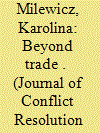

|
|
|
|
|
| Summary/Abstract |
Increased complexity and density of transnational problems create unprecedented challenges and opportunities for contemporary international governance. “Issue linkage” is one institutional arrangement through which states address these changing circumstances. In this article, we examine the widening scope of the nontrade agenda in preferential trade agreements (PTAs). Nontrade issues (NTIs) such as human rights, democracy, environment, corruption, and labor standards are increasingly linked to PTAs. This issue linkage has important implications for understanding changing patterns of international trade, including the shift to PTAs and the rise of NTIs. We show that (1) states’ choices to commit to bilateral or plurilateral versions of traditional PTAs and to PTAs with NTIs are highly interdependent, (2) states increasingly incorporate NTIs into PTAs, as the associated costs of policy change are lowered through earlier agreements, and (3) network pressures favor the increasing adoption of bilateral and especially plurilateral NTIs over time. Using an original data set on NTIs covering 522 PTAs and spanning the period 1951 to 2009, we evaluate states’ motives behind the widening nontrade agenda of trade agreements using longitudinal network modeling. We employ multiplex coevolution stochastic actor-oriented network models in a novel design to account for interdependencies within and across states’ decisions. Following a descriptive mapping of major NTIs, we evaluate our theoretical arguments. Testing against the alternative explanations of power and commitment, we find that endogenous cost considerations are the most significant factor explaining the inclusion of NTIs into PTAs.
|
|
|
|
|
|
|
|
|
|
|
|
|
|
|
|
| 2 |
ID:
150991


|
|
|
|
|
| Summary/Abstract |
There is a tremendous amount of variation in conflict intensity both across and within civil conflicts. Some conflicts result in huge numbers of battle deaths, while others do not. Conflict intensity is also dynamic. Conflict intensity escalates, de-escalates, and persists. What explains this variation? We take one of the most prominent explanations for the onset and occurrence of civil conflict—variation in economic conditions—and apply it to the intensity and dynamics of civil conflict. Using an instrumental variables strategy and a rich set of empirical models, we find that the intensity of conflict is negatively related to per capita income. We also find that economic conditions affect conflict dynamics, as poorer countries are likely to experience longer and more intense spells of fighting after the onset of conflict.
|
|
|
|
|
|
|
|
|
|
|
|
|
|
|
|
| 3 |
ID:
147694
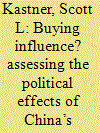

|
|
|
|
|
| Summary/Abstract |
It is widely believed that China’s growing links to the global economy are translating into increased Chinese political influence abroad. This article explores this possibility quantitatively by examining whether increased trade with China correlates with an increased willingness by countries to accommodate Chinese interests. I use newly collected data that capture cross-national variation in the willingness of individual countries to support Chinese government positions relating to Taiwan and Tibet, and China’s status as a market economy. I find that increased trade dependence on China is correlated with an increased likelihood of taking an accommodating stance on the economic issue (market economy status). But the evidence linking trade to an accommodating stance on the political issues is more ambiguous.
|
|
|
|
|
|
|
|
|
|
|
|
|
|
|
|
| 4 |
ID:
143299
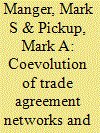

|
|
|
|
|
| Summary/Abstract |
The proliferation of preferential trade agreements (PTAs) and the wave of democratization are among the most significant developments in international relations during the past three decades. The correlation between these is well noted. The causal link between these phenomena, however, remains unclear. On one hand, democracies have been found to be more likely to join PTAs. On the other hand, trade agreements should foster democratization because they undermine the ability of governments to distribute rents to maintain an autocratic regime. If PTAs and democracy coevolve through a selection and a contagion effect, then conventional statistical techniques can produce wholly misleading results. This article presents a new approach based on recent advancements in longitudinal network analysis. Our findings confirm that historically, democratization indeed made states more likely to sign PTAs, but that trade agreements also encourage the democratization of a country, in particular if the PTA partners are themselves democracies.
|
|
|
|
|
|
|
|
|
|
|
|
|
|
|
|
| 5 |
ID:
151155
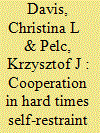

|
|
|
|
|
| Summary/Abstract |
Hard times give rise to greater demand for protection. International trade rules include provisions that allow for raising barriers to aid industries when they suffer economic injury. Yet widespread use of flexibility measures may undermine the trade system and worsen economic conditions. How do states balance these conflicting pressures? This article assesses the effect of crises on cooperation in trade. We hypothesize that governments impose less protectionism during economic crisis when economic troubles are widespread across countries than when they face crisis in isolation. The lesson of Smoot–Hawley and coordination through international economic institutions represent mechanisms of informal governance that encourage cooperation to avoid a spiral of protectionism. Analysis of industry-level data on protection measures for the period from 1996 to 2011 provides support for our claim that under conditions of shared hard times, states exercise strategic self-restraint to avoid beggar-thy-neighbor policies.
|
|
|
|
|
|
|
|
|
|
|
|
|
|
|
|
| 6 |
ID:
119484
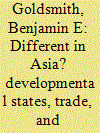

|
|
|
|
|
| Publication |
2013.
|
| Summary/Abstract |
In this article, I ask what might be the effect of international trade on interstate conflict in Asia and the Pacific. Overall, the associations of trade interdependence and trade volume in the region appear similar to those globally: interdependence is accompanied by a reduction in the chance of militarized conflict onset, whereas the volume of trade appears to reduce the chance of conflict escalation to deadly international violence. I suggest a partial exception for East Asia, implying weaker associations between trade and pacific outcomes. I argue that the regionally common 'developmental state' model allows such states to more freely, but less credibly, use trade as a foreign policy tool, reducing trade's constraint upon East Asian states in security affairs. Analyses of East Asian dyads and of developmental states in data from all regions of the globe support my contention that trade interdependence has weaker pacific effects in these contexts, although some other expectations are not supported.
|
|
|
|
|
|
|
|
|
|
|
|
|
|
|
|
| 7 |
ID:
159863


|
|
|
|
|
| Summary/Abstract |
Political economy debates about the influence of power configurations in expanding and maintaining global liberalization ebb and flow with the wax and wane of the concentration of power in the international system. This article engages the debate in a novel way from previous scholarship. Employing a series of econometric models that account for regional power, I argue that the global power concentration is ill fit to be the primary predictor of trade liberalization, but instead, regional power fluctuations can dampen and enhance global trends. By incorporating subsystemic power configurations, we gain a better understanding of the regional variation in states buying into or cashing out of interdependence.
|
|
|
|
|
|
|
|
|
|
|
|
|
|
|
|
| 8 |
ID:
167382
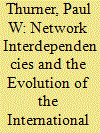

|
|
|
|
|
| Summary/Abstract |
Since few states are able to produce all of their own military hardware, a majority of countries’ military systems rely on weapon imports. The structure of the international defense technology exchange network remains an important puzzle to understand, along with the factors that drive its evolution. Drawing on a political economy model of arms supply, we propose a new network-oriented explanation for the worldwide transactions of major conventional weapons in the period after World War II. Using temporal exponential random graph models, our dynamic approach illustrates how network dependencies and the relative weighting of economic versus security considerations vary over time. One of our major results is to demonstrate how security considerations started regaining importance over economic ones after 2001. Additionally, our model exhibits strong out-of-sample predictive performance, with network dependencies contributing to model improvement especially after the Cold War.
|
|
|
|
|
|
|
|
|
|
|
|
|
|
|
|
| 9 |
ID:
078689
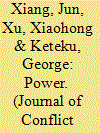

|
|
|
|
|
| Publication |
2007.
|
| Summary/Abstract |
We join the debate on trade interdependence and conflict with a reexamination of Barbieri's (1996) intriguing empirical results showing that under certain circumstances, trade interdependence causes conflict. We argue that these findings resulted from a specification that was missing a variable. We return to Barbieri's models and introduce two independent power measures for countries within each dyad. When a correctly specified trade-conflict regression model incorporating the new power variables is performed, the constraining effect of interdependence becomes evident, and the results obtained are the reverse of Barbieri's.
|
|
|
|
|
|
|
|
|
|
|
|
|
|
|
|
| 10 |
ID:
164159
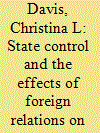

|
|
|
|
|
| Summary/Abstract |
Can governments still use trade to reward and punish partner countries? While World Trade Organization (WTO) rules and the pressures of globalization restrict states’ capacity to manipulate trade policies, politicization of trade is likely to occur where governments intervene in markets. We examine state ownership of firms as one tool of government control. Taking China and India as examples, we use new data on bilateral trade disaggregated by firm ownership type as well as measures of political relations based on bilateral events and United Nations voting data to estimate the effect of political relations on import flows since the early 1990s. Our results support the hypothesis that imports controlled by state-owned enterprises are more responsive to political relations than imports controlled by private enterprises. This finding suggests that politicized import decisions will increase as countries with partially state-controlled economies gain strength in the global economy. Extending our analysis to exports for comparison, we find a similar pattern for Indian but not for Chinese exports and offer potential explanations for these differential findings.
|
|
|
|
|
|
|
|
|
|
|
|
|
|
|
|
|
|
|
|
|